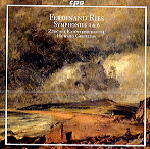Ries imitates me too greatly, was Beethoven’s complaint about his one-time pupil and devoted disciple. Indeed, in Ries’ 1818 Symphony No. 4 the Beethovenian fingerprints are everywhere, most certainly in the carbon-copy orchestration but also in key features of his master’s style: the abrupt dynamic contrasts, driving rhythms, and those ubiquitous dominant-seventh tutti chords. As the work proceeds from its dramatic, Fidelio-like introduction, hints of passages from Beethoven’s Fifth and Sixth pop in and out. The finale seems to borrow a bit from Beethoven’s Fourth, while the scherzo quotes nearly verbatim a passage from Symphony No. 1. Derivative? Perhaps, but enjoyable nonetheless.
Symphony No. 6 is another story altogether, as by 1822 Ries had broken free of his earlier style and began to move in his own direction. The Sixth is a dramatic, harmonically rich work reminiscent of Weber, Mendelssohn, and Schumann, though at times the music’s high-romantic styling and mode of expression seem to point to early Wagner (especially in the first movement) or even Bruckner (the heavy-treading scherzo and the serenely beautiful larghetto). Howard Griffiths’ lively conducting and the committed and enthusiastic playing of the Zurich Chamber Orchestra make a strong case for these intriguing symphonies, while CPO’s spacious, dynamic, and detailed recording makes this disc easily recommendable.
































